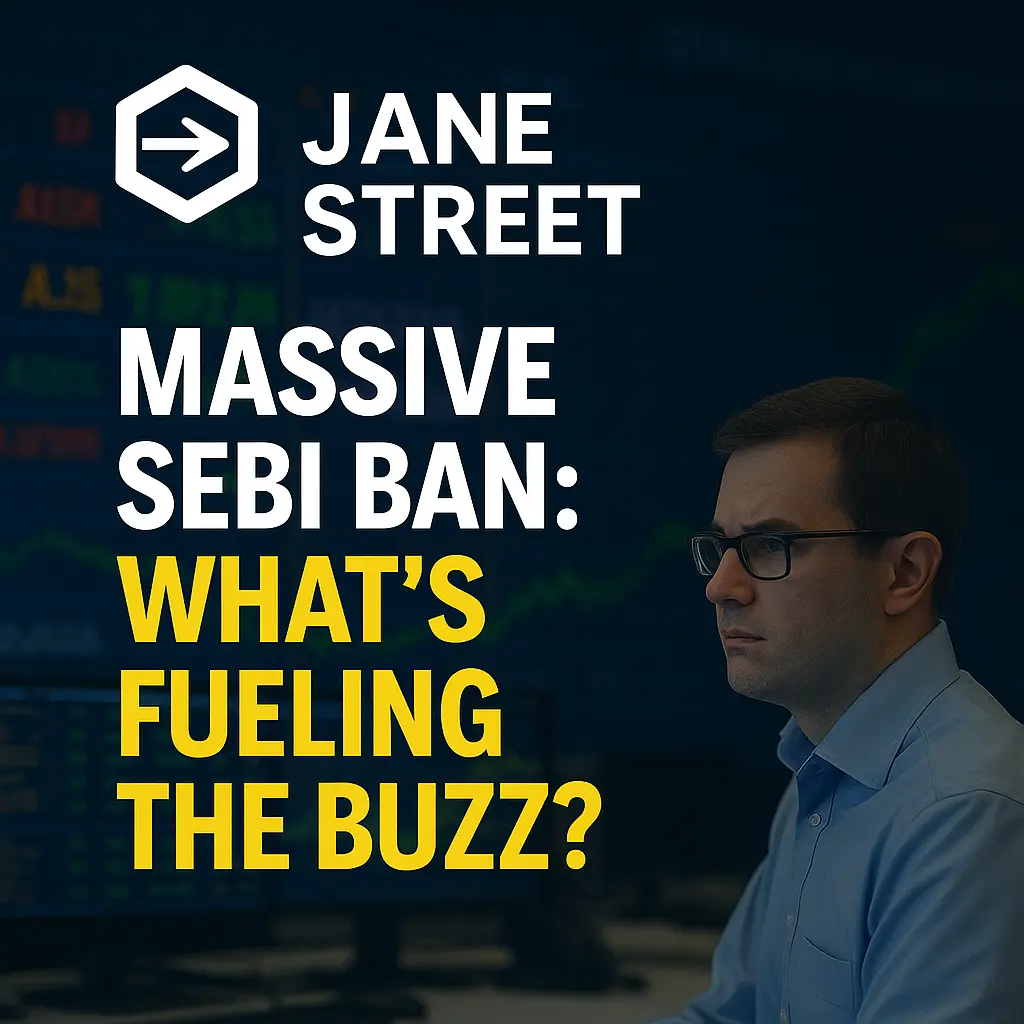SEBI bars Jane Street, freezes ₹4,840 Cr. Impact on BSE, Angel One, and India’s derivatives market explained. India’s market watchdog delivers a rare regulatory blow to Jane Street, causing ripples across BSE, Angel One, and the entire Indian options ecosystem.
Table of Contents
ToggleThe Shock That Rocked Jane Street Group:
In a move that stunned India’s financial markets, the Securities and Exchange Board of India (SEBI) has barred Jane Street Group, one of the world’s biggest proprietary trading firms, from participating in the Indian securities market. The regulator has frozen a staggering ₹4,840 crore linked to the firm and its affiliates for allegedly manipulating the benchmark indices — Nifty 50 and Bank Nifty — through sophisticated trading patterns over the last two years.
The SEBI order, issued on July 3, 2025, has sent tremors through Dalal Street, triggering investor panic and raising serious questions about the transparency of index pricing and the safety of Indian retail investors.
Why Jane Street Was Banned: The Allegations
According to SEBI’s 111-page interim order, Jane Street and associated entities orchestrated repeated manipulative intraday trades designed to influence the closing prices of Nifty and Bank Nifty on monthly expiry days. This practice, known as “Marking the Close”, was allegedly executed on 15 out of 18 expiry days studied between June 2022 and March 2025.
SEBI’s Core Allegations:
| 🔎 Issue | 🧾 Details |
|---|---|
| Index Manipulation | Jane Street’s orders altered index values during expiry |
| Volume Surge | Spike in option trades just before market close |
| Retail Investor Impact | Alleged unfair profit at the cost of small traders |
| Violation of Market Integrity | Undermining fair price discovery process |
| Fund Lockdown | ₹4,840 Cr to be moved to escrow with lien to SEBI |
SEBI has directed all linked banks to freeze debit transactions and requested the creation of an escrow account, ensuring the firm cannot repatriate the funds while investigations are ongoing.
Fallout on Indian Stocks: BSE, Angel One, Nuvama Take a Hit
The ripple effect was immediate. The market saw a sharp drop in trading and brokerage stocks, especially those with known exposure to derivative volumes.
📊 Market Impact Snapshot:
| 📈 Stock | 📉 Drop % | 📌 Reason |
|---|---|---|
| BSE Ltd. | ↓ 6.2% | Fear of lower derivatives turnover |
| Angel One | ↓ 5.8% | High dependency on options volumes |
| Nuvama Wealth | ↓ 6.4% | Alleged local partner of Jane Street |
| Nifty 50 | Flat | Index stable despite volatility fears |
| Sensex | Flat | Market absorbs shock due to broad strength |
Notably, Angel One saw heightened activity from retail traders who panicked over the future of derivative contracts. The brokerage has issued no formal comment yet, but analysts believe the firm could see a temporary dip in intraday trading volumes.
Behind the Curtain: What SEBI Saw That Others Missed
SEBI’s forensic algorithm detected a unique trading pattern:
- Small trades with disproportionate price impact placed seconds before the market close.
- Trades were executed by multiple FPIs, but traced back to Jane Street’s network, allegedly designed to avoid detection.
- Use of “Synthetic Options” strategies to avoid large positions on record.
What makes this case unusual is the multi-layered masking used. SEBI identified that even Indian-registered entities were used to mirror positions — raising concerns over regulatory loopholes and possible oversight failure at the broker level.
Escrow Directive: A First-of-its-Kind in Indian Regulation
In an extraordinary move, SEBI ordered Jane Street and related entities to move ₹4,840 crore to an escrow account under SEBI’s lien. This effectively prevents capital flight and guarantees recovery if the allegations are upheld in court.
Key Conditions of the Escrow:
- Funds cannot be withdrawn or transferred
- Jane Street cannot trade in India until further notice
- Entities include both FPIs and Indian-registered counterparts
This level of enforcement is unprecedented and marks a shift in SEBI’s posture from reactive to preemptive regulation — one that signals India is ready to hold even global giants accountable.
Global Reaction: Jane Street’s Silence Speaks Volumes
As of now, Jane Street has not issued a public statement, sparking speculation across global markets. Sources say the firm may challenge the interim order in SAT (Securities Appellate Tribunal) or higher courts, but this remains unconfirmed.
Analysts believe this incident may also lead to global regulatory scrutiny of Jane Street’s strategies in other markets like the U.S. and Hong Kong.
What This Means for Indian Markets
This SEBI action comes just days after new derivatives trading restrictions came into effect on July 1, aimed at curbing concentration and protecting retail investors.
Experts say this crackdown will:
- Cool down the overheated options market
- Reduce excessive leverage among retail traders
- Increase compliance requirements for brokers
- Possibly boost investor trust in SEBI’s oversight
Expert View:
“This is SEBI’s strongest stance yet against high-frequency prop trading manipulation. It sends a loud message: If you try to game Indian markets, no matter how big you are, you’ll face the consequences.”
— Anand Tandon, Independent Market Analyst












